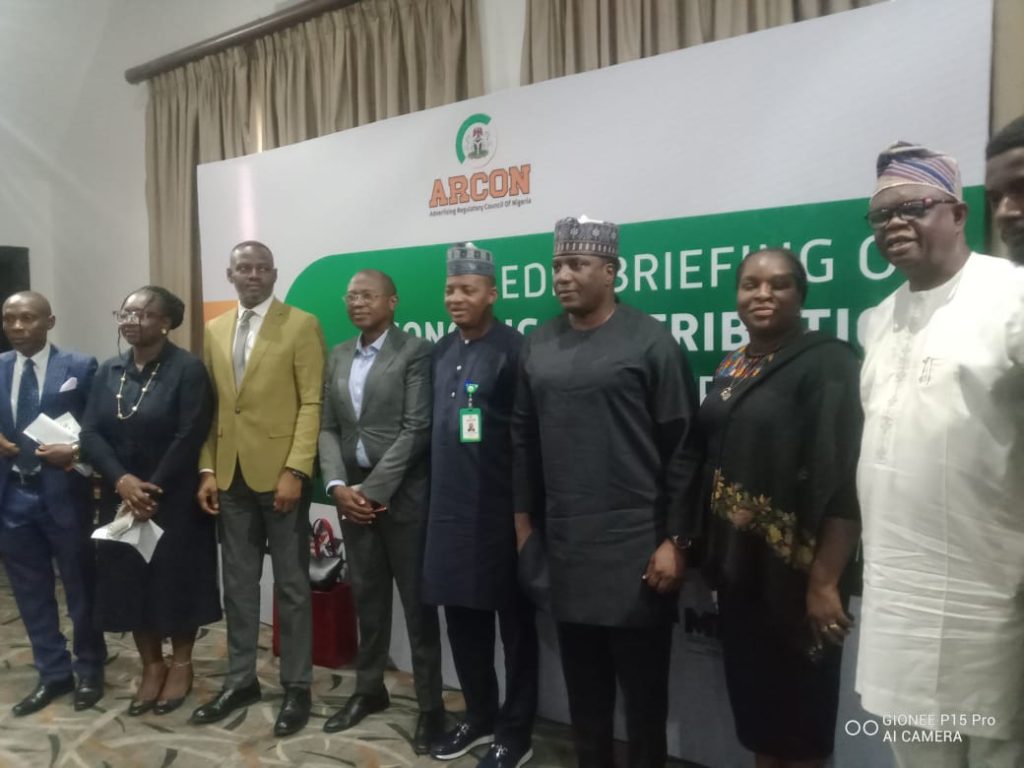
A new report commissioned by the Advertising Regulatory Council of Nigeria (ARCON) and funded by various industry associations has highlighted the advertising sector’s significant contribution to Nigeria’s Gross Domestic Product (GDP). Conducted by PricewaterhouseCoopers (PwC), the report was presented to stakeholders on Tuesday during a media briefing in Lagos.
Speaking at the unveiling, ARCON Director-General, Dr. Olalekan Fadolapo, expressed optimism about the industry’s recent achievements, including the launch of an Audience Measurement initiative last week. He thanked the sectoral groups, such as the Experiential Marketers Association of Nigeria (EXMAN), Association of Advertising Agencies of Nigeria (AAAN), Outdoor Advertising Agencies of Nigeria (OAAN), Media Independent Practitioners Association of Nigeria (MIPAN), and the Broadcasting Organisation of Nigeria (BON), for funding the study.
“We cannot continue to guess and estimate the size of the industry. This report lays the foundation for us to assess the advertising space and its multiplier effect on the economy every year going forward,” Fadolapo said. He emphasized the industry’s crucial role in driving consumer demand, business growth, employment, and innovation.
Fadolapo also mentioned that, alongside the Audience Measurement and GDP Multiplier Effect report, ARCON is set to host an event on the rebrand Nigeria project and other initiatives outlined in the National Advertising Conference communique.
Tunji Adeyinka, Chairman of the National Advertising Conference, explained the genesis of the study, stating that the 2022 conference identified a gap in understanding the industry’s GDP contribution, prompting the engagement of PwC for a credible assessment. The report focused on the direct monetary contribution of the advertising industry to GDP and its multiplier effect, illustrating the broader economic impact of advertising investment.
Dr. Femi Adelusi, Chairman of the Multiplier Study Committee, presented the study’s findings, revealing the profound impact of Nigeria’s marketing communications industry on the nation’s economic growth. “The marketing communications sector has emerged as a formidable economic powerhouse. The study estimates that for every ₦1 spent on marketing communications in Nigeria, the nation’s GDP increases by ₦16.5, highlighting the industry’s substantial value contribution.”
The report noted that total expenditure on marketing communications reached ₦605.2 billion in 2023, growing at a compound annual growth rate (CAGR) of 18.7 percent from ₦216 billion in 2018. This trajectory is expected to continue, with spending projected to reach ₦893 billion by 2028, contributing 1.08 percent to Nigeria’s GDP, up from 0.7 percent in 2023.
Adelusi detailed the top contributors to marketing communication spend between 2018 and 2023, identifying cable TV (25.5%), digital media (18.5%), and creative & content production (13.4%) as leading segments. The rise in cable TV was attributed to diverse content offerings and affordable packages, while the surge in digital media spend was driven by increased internet and mobile penetration, and the popularity of social media and video-on-demand platforms.
The study also highlighted the growing influence of creative and content production, which saw a CAGR of 15.8 percent between 2018 and 2023, bolstered by smartphone usage, social media engagement, and real-time online content. Investments by platforms like Netflix and Amazon Prime in Nigerian productions, particularly in Nollywood, further strengthened this segment.
Despite challenges such as economic pressures, regulatory reforms, and global competition, the study underscored the industry’s strengths, including rising digital trends, opportunities for local and international partnerships, and leveraging technological innovations like AI and big data analytics.
To accelerate industry growth, the study recommended setting measurable goals for GDP contribution, establishing a Joint Industry Body (JIB) for operational coordination, encouraging strategic alliances, adopting a “global” approach that blends international best practices with local initiatives, and utilizing analytics tools to track spending patterns and consumer behavior meticulously.
“The marketing communications industry is an economic force that deserves recognition and support. By implementing these recommendations, we can unlock the industry’s full potential, drive sustainable growth, foster job creation, and cement Nigeria’s position as a leading marketing communications hub in Africa and beyond,” Adelusi concluded.
Industry stakeholders praised the study, recognizing the immense opportunities it unveils. Among those at the event were Mrs. Tolulope Medebem, President of EXMAN; Mrs. Brenda Nwagwu, Vice President of MIPAN; Mr. Steve Babaeko, President of AAAN; Kenny Ogungbe from BON; and Mr. Sola Akinsiuku, President of OAAN. They acknowledged the study’s findings as a significant step towards harnessing the sector’s potential to shape Nigeria’s economic future.


2 Comments